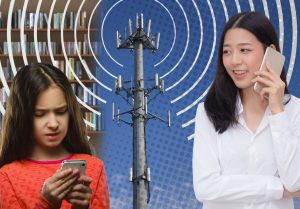 According to the latest annual visual networking index forecast from Cisco, there will be four networked devices and connections per person across the globe by 2021. While there is no denying the many positive attributes of electronics and global connectivity, research indicates that some health concerns may be tied to our devices. Cancer from phones
According to the latest annual visual networking index forecast from Cisco, there will be four networked devices and connections per person across the globe by 2021. While there is no denying the many positive attributes of electronics and global connectivity, research indicates that some health concerns may be tied to our devices. Cancer from phones
Smartphones, flip phones and their predecessors give off a form of energy known as radiofrequency, or RF. As the amount of time spent on phones has increased, concerns have been raised as to the possible health ramifications of RF exposure on the body.
The American Cancer Society says RF waves are a form of non-ionizing radiation. They are different from the stronger, ionizing types of radiation that can affect the chemical structure of DNA in the body. But there is some concern that RF may contribute to the formation of cancer in the body. A large study by the US National Toxicology Program (NTP) exposed large groups of lab rats and mice to RF energy over their entire bodies for about nine hours a day, starting before birth and continuing for up to two years. Results indicated an increased risk of tumors called malignant schwannomas of the heart in male rats exposed to RF radiation.
The International Agency for Research on Cancer has classified RF fields as “possibly carcinogenic to humans.” Although cancer risk is very low and not undeniably linked to phone use, it is something for people to keep in the back of their minds, and limiting phone use may help reduce risk.
Mobile device use and social media addiction
Increased use of technology may be linked to decreases in attention and increases in behavior and self-regulation problems for adolescents already at risk for mental health problems, says a study from Duke University. One hundred fifty-one adolescents were studied using digital technologies for an average of 2.3 hours a day. The researchers found that, on days when adolescents used their devices more, both when they exceeded their own normal use and when they exceeded average use by their peers, they were more likely to exhibit conduct problems such as lying and fighting.
Also, as published in Psychiatric News, time spent on multiple social media outlets is considered a risk factor for mental health problems. Researchers found people who reported using the greatest number of social media sites (seven to 11) had more than three times the risk of depression and anxiety.
Other health concerns
Neck pain, wrist and elbow strain, eye strain, and other fatigue factors have been linked to computer use.

A study published in the U.S. Proceedings of the National Academy of Sciences showed that people using tablets for at least four hours before bedtime took longer to fall asleep than people who hadn’t used them.
And recently, popular exercise tracker FitBit® came under fire when people were shocked while wearing the devices, and these types of trackers may cause people to micromanage their fitness, detracting from the psychological benefits of exercise.
Electronics are important components of daily life. But devices may contribute to serious health problems.






